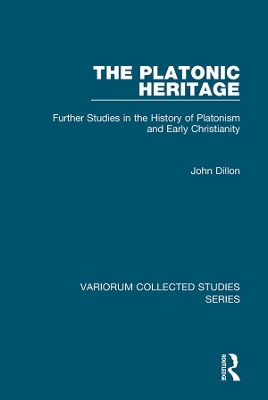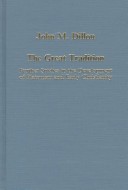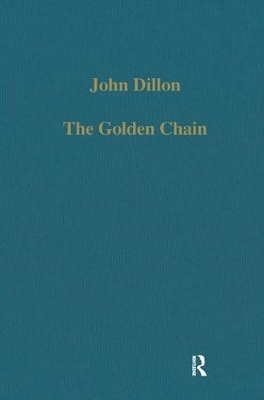Variorum Collected Studies
3 total works
This third collection of articles by John Dillon covers the period 1996-2006, the decade since the appearance of The Great Tradition. Once again, the subjects covered range from Plato himself and the Old Academy, through Philo and Middle Platonism, to the Neoplatonists and beyond. Particular concerns evidenced in the papers are the continuities in the Platonic tradition, and the setting of philosophers in their social and cultural contexts, while at the same time teasing out the philosophical implications of particular texts. Such topics are addressed as atomism in the Old Academy, Philo's concept of immateriality, Plutarch's and Julian's views on theology, and peculiar features of Iamblichus' exegeses of Plato and Aristotle, but also the broader questions of the social position of the philosopher in second century A.D. society, and the nature of ancient biography.
CS 599
This collection of articles explores a broad range of issues relating to the development of Platonism. The volume takes in such figures as John Scotus Eriugena and Salomon ibn Gabirol, while bearing witness to an understanding and appreciation of the last head of the Platonic Academy, Damascius. The volume begins with a study of an aspect of Plato himself, his distinctly ironic way of making use of the ancient concept of the "golden age" and the history of a notion that he bequeathed to his successors, the idea that the philosopher should develop something of an "art" or "science" of erotics. The volume continues on to explore areas such as the philosophical stature of Plato's nephew and successor, Speusippus, the functioning of Platonic dialogues within the intellectual life of the school, issues and figures within middle Platonism - notably Philo of Alexandria and Plutarch - various aspects of Plotinus' thought, evidence from Porphyry and Iamblichus and different aspects of the philosophy of Proclus.
This volume gathers together a series of widely -scattered articles concerned with the great tradition of Platonic scholarship ” The Golden Chain” from the time of Plato himself up into the period of Middle Platonism. The main emphasis, however, is on the first three centuries AD. The first articles address the question of what exactly was the nature of the Platonic school at various stages of its development and what kind of organization the Academy may have had. The following ones present studies on figures from Speusippus in the Old Academy, through Philo of Alexandria and Origen (more honorary members of the Golden Chain), to Plotinus, Iamblichus and Proclus, and on some more general issues, such as the fall of the soul, which span much of the period. Dans ce volume sont rassembles des articles jusque”la très dispersés et qui traitent de la grande tradition du savoir platonicien ” la "Chaîne d'Or"” Sur une période allant de Platon au Moyen”Platonisme et à l'avènement de la pensée chrétienne. Cependant, l'accent est surtout mis sur les trois premières siècles ap. J.C. Les premières articles s'attachent à la nature exacte de l'Ecole platonicienne à différents stades de son évolution et aussi a l'organisation adoptée par "l'Académie". Les études suivantes examinent différents personnages, de Speusippe, qui appartenait à l'Ancienne Académie, en passant par Philon d'Aleandrie et Origiène (membres semi”honoraires de la Chaîne d'Or), jusqu'à Plotin, Iamblique et Procle; y sont aussi traitées des questions d'ordre plus général, telles la chute de l'âme, qui furent embrassées durant la majeure partie de cette période.


